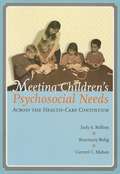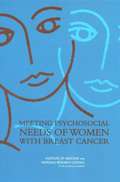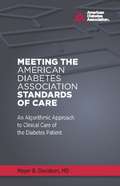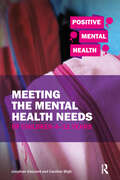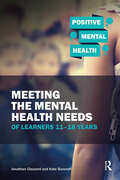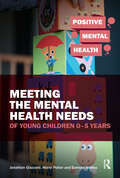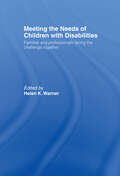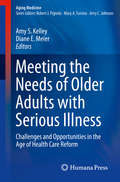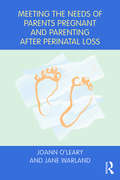- Table View
- List View
Meeting Children's Psychosocial Needs Across the Healthcare Continuum
by Judy Rollins Rosemary Bolig Carmel MahanMeeting Children's Psychosocial Needs Across the Health-Care Continuum integrates current research and theory within the framework of the new and transitioning health-care environment. Despite the changes we experience now and in the future, children in health-care settings--in the home, child care center, school, community agency, ambulatory setting, or hospital--continue to need what they have always needed: the basics, such as nurturing, predictability, adequate stimulation, interaction, a sense of control, and mastery of their environments.
Meeting Psychosocial Needs Of Women With Breast Cancer
by Institute of Medicine National Research Council of the National AcademiesIn Meeting Psychosocial Needs of Women with Breast Cancer, the National Cancer Policy Board of the Institute of Medicine examines the psychosocial consequences of the cancer experience. The book focuses specifically on breast cancer in women because this group has the largest survivor population (over 2 million) and this disease is the most extensively studied cancer from the standpoint of psychosocial effects. The book characterizes the psychosocial consequences of a diagnosis of breast cancer, describes psychosocial services and how they are delivered, and evaluates their effectiveness. It assesses the status of professional education and training and applied clinical and health services research and proposes policies to improve the quality of care and quality of life for women with breast cancer and their families. Because cancer of the breast is likely a good model for cancer at other sites, recommendations for this cancer should be applicable to the psychosocial care provided generally to individuals with cancer. For breast cancer, and indeed probably for any cancer, the report finds that psychosocial services can provide significant benefits in quality of life and success in coping with serious and life-threatening disease for patients and their families.
Meeting the American Diabetes Association Standards of Care
by Mayer B. DavidsonImproving glycemic, lipid, and blood pressure outcomes is the essence of diabetes care. Maintaining consistently positive results is an ongoing challenge for every healthcare professional. After years of clinical practice, Mayer Davidson, MD, has developed a series of algorithmic techniques that can increase positive results. Based on ADA's Standards of Care, this book offers detailed treatment algorithms that have been shown to be clinically effective in improving outcomes in people with diabetes.
Meeting the Mental Health Needs of Children 4-11 Years (Positive Mental Health)
by Jonathan Glazzard Caroline BlighHelps teachers to identify and support primary-aged children with mental health needs, providing a range of evidence-based tools. The mental health and well-being of children in primary schools is a current concern. Do you feel equipped to identify mental health needs in your pupils? Do you have the knowledge and understanding to adequately support them? Do you understand where your responsibilities start and stop? This book helps you address these questions and more, providing a range ofevidence-based strategies and tools. It introduces the various risk factorsinvolved, shows how you can build resilience in children, and focuses on identifying and supporting both specific mental health needs and particular groups of pupils.
Meeting the Mental Health Needs of Learners 11-18 Years (Positive Mental Health)
by Jonathan Glazzard Kate BancroftThe mental health of young people in secondary schools is a current concern. Do you feel equipped to identify mental health needs in your learners? Do you have the knowledge and understanding to adequately support them? Do you understand where your responsibilities start and stop? This book helps you address these questions and more, providing a range ofevidence-based strategies and tools. It introduces the various risk factorsinvolved, shows how you can build resilience in your students, and focuseson identifying and supporting both specific mental health needs and particulargroups of learners.
Meeting the Mental Health Needs of Young Children 0-5 Years (Positive Mental Health)
by Samuel Stones Marie PotterThe mental health of children is a current concern, and this applies even to the earliest years of a child’s life. This book supports trainees and practitioners working in early years contexts to understand the risk factors which can result in the development of mental health needs in children from birth to 5. It argues that high quality early years provision can mitigate against some of these risk factors and provides clear, evidence-informed guidance around government policy, transitions, attachment and working with parents or carers.
Meeting the Needs of Children with Disabilities: Families and Professionals Facing the Challenge Together
by Helen K. WarnerThis textbook provides the reader with an insight into the needs of children with both physical and learning disabilities, particularly within an acute care setting. It considers the principles that underpin the fundamental aspects of care delivery to children with special needs. The key areas of knowledge and practical skills covered include: the social and historical context challenging assumptions best practice for giving news to parents communication methods play and movement nutrition and feeding boundary setting respite care transitions into adult services. This interesting book covers practice areas identified by the English National Board as essential for student nurses. It will also be invaluable for qualified nurses and for other health professionals working with children with disabilities.
Meeting the Needs of Older Adults with Serious Illness
by Diane E. Meier Amy S. KelleyMeeting the Needs of Older Adults with Serious Illness: Challenges and Opportunities in the Age of Health Care Reform provides an introduction to the principles of palliative care; describes current models of delivering palliative care across care settings, and examines opportunities in the setting of healthcare policy reform for palliative care to improve outcomes for patients, families and healthcare institutions. The United States is currently facing a crisis in health care marked by unsustainable spending and quality that is poor relative to international benchmarks. Yet this is also a critical time of opportunity. Because of its focus on quality of care, the Affordable Care Act is poised to expand access to palliative care services for the sickest, most vulnerable, and therefore most costly, 5% of patients- a small group who nonetheless drive about 50% of all healthcare spending. Palliative care is specialized medical care for people with serious illnesses. It focuses on providing patients with relief from the symptoms, pain, and stress of a serious illness--whatever the diagnosis or stage of illness. The goal is to improve quality of life for both the patient and the family. Research has demonstrated palliative care's positive impact on health care value. Patients (and family caregivers) receiving palliative care experience improved quality of life, better symptom management, lower rates of depression and anxiety, and improved survival. Because patient and family needs are met, crises are prevented, thereby directly reducing need for emergency department and hospital use and their associated costs. An epiphenomenon of better quality of care, the lower costs associated with palliative care have been observed in multiple studies. Meeting the Needs of Older Adults with Serious Illness: Challenges and Opportunities in the Age of Health Care Reform, a roadmap for effective policy and program design, brings together expert clinicians, researchers and policy leaders, who tackle key areas where real-world policy options to improve access to quality palliative care could have a substantial role in improving value.
Meeting the Needs of Parents Pregnant and Parenting After Perinatal Loss
by Joann M O'Leary Jane WarlandDespite research which highlights parents’ increased anxiety and risk of attachment issues with the pregnancy that follows a perinatal loss, there is often little understanding that bereaved families may need different care in their subsequent pregnancies. This book explores the lived experience of pregnancy and parenting after a perinatal loss. Meeting the Needs of Parents Pregnant and Parenting After Perinatal Loss develops a helpful framework, which integrates continuing bonds and attachment theories, to support prenatal parenting at each stage of pregnancy. Giving insight into how a parent’s world view of a pregnancy may have changed following a loss, readers are provided with tools to assist parents on their journey. The book discusses each stage of a pregnancy, as well as labor and the postpartum period, before examining subjects such as multi-fetal pregnancies, reluctant terminations, use of support groups, and the experiences of fathers and other children in the family. The chapters include up-to-date research findings, vignettes from parents reflecting on their own experiences and recommendations for practice. Written for researchers, students and professionals from a range of health, social welfare and early years education backgrounds, this text outlines what we know about supporting bereaved families encountering the challenges of a subsequent pregnancy.
Mehr Fallbeispiele Notfallmedizin: Einprägsam - spannend - mit Lerneffekt
by Volker WenzelNach dem erfolgreichen Buch Fallbeispiele Notfallmedizin erscheint mit Mehr Fallbeispiele Notfallmedizin ein weiteres Werk mit realen, spannenden und lehrreichen Fallbeispielen. Langjährig erfahrene Profis aus der Notfallmedizin schildern oft dramatisch verlaufene und menschlich berührende Notfalleinsätze, mit denen sie im Laufe ihres Berufslebens konfrontiert worden sind. Jeder Fall wird anhand aktueller Literatur diskutiert und schließt mit einem Fazit für die Praxis. Es wendet sich an alle, die in der Notfall - und Rettungsmedizin tätig sind und von der Erfahrung der Kolleginnen und Kollegen lernen wollen. Notärzte, Notärztinnen, Rettungssanitäter und Rettungssanitäterinnen erhalten so wertvolle Tipps für eigene, zukünftige Notfalleinsätze.
Mehr Komplikationen in der Anästhesie: Fallbeispiele - Analyse - Prävention
by Matthias HüblerNach dem erfolgreichen Buch Komplikationen in der Anästhesie folgen nun mit Mehr Komplikationen in der Anästhesie weitere, spannende Fallbeispiele aus der täglichen Praxis, bei denen es zu Komplikationen oder Beinahe-Zwischenfällen gekommen ist. In unvergleichlicher Art und Weise - mit Tiefgang und dramaturgisch ausgefeilt - schildern und analysieren die Autoren typische Kliniksituationen und Klinikabläufe. Sie beleuchten dabei, welche Rolle menschliche und organisatorische Fehler für das Zustandekommen der Zwischenfälle gespielt haben und wie sich diese künftig vermeiden lassen. Dabei lernt der Leser quasi nebenbei, eingewoben in die Fälle, wichtige Fakten des Faches Anästhesiologie. Für alle Anästhesisten in Klinik oder Praxis, die aus Fehlern lernen oder sich gegenüber Gefahrensituationen sensibilisieren möchten.
Mehrkanal-Bioimpedanz-Instrumentierung: Zeitaufgelöste Messung physiologischer Ereignisse
by Roman KuscheZur Entwicklung neuer biomedizinischer Messverfahren werden theoretische Ansätze, technische Umsetzungen und Charakterisierungen von Mehrkanal-Bioimpedanz-Instrumentierungen vorgestellt. Diese ermöglichen die simultane Messung der passiven elektrischen Gewebeeigenschaften an unterschiedlichen Körperstellen. Es wird gezeigt, wie aus den abgeleiteten Signalen Informationen bezüglich des Herz-Kreislauf-Systems gewonnen werden können, wobei insbesondere auf die Impedanz-Plethysmographie eingegangen wird. Bei dem zweiten behandelten Anwendungsschwerpunkt handelt es sich um die Detektion von Muskelkontraktionen mittels Impedanz-Myographie, insbesondere zur Ansteuerung von Prothesen.
Mein Leitfaden Psychiatrie: Basiskompetenzen für den Klinikalltag
by Jan Philipp Klein Eva Margaretha KleinDieses Buch vermittelt Ihnen die Kenntnisse, die Sie für eine sichere und souveräne Bewältigung des klinischen Alltags in den ersten Jahren Ihrer Weiterbildung als Psychiater und Psychotherapeut benötigen. Es enthält die wichtigsten klinischen Fertigkeiten, angefangen bei Grundfertigkeiten wie Anamnese und Diagnostik, bis hin zum konkreten Vorgehen in der Psychotherapie und Pharmakotherapie der wichtigsten psychischen Störungen. Schritt für Schritt werden auch die wichtigsten Handgriffe, z. B. für die Durchführung von Elektrostimulationsbehandlungen, sowie der Ablauf von Unterbringung und Behandlung nach PsychKG und BGB übersichtlich und gut verständlich dargestellt. Das Buch wendet sich vor allem an Berufsanfänger, die sich einen möglichst sicheren und souveränen Einstieg in den klinischen Alltag in diesem Fachbereich wünschen. Aber auch „alten Hasen“ kann es ein wertvolles Nachschlagewerk sein, in dem man schnell alles Wichtige findet.
Mein Mann hat Krebs: Wie gehen wir als Paar mit der Erkrankung um
by Tanja Zimmermann Jochen ErnstDiagnose Krebs – füreinander da sein! Dieser Ratgeber richtet sich an Paare, bei denen der Mann an Krebs erkrankt ist. Er unterstützt die Partnerin bzw. den Partner des Erkrankten und bietet Hilfe bei der Bewältigung paarbezogener Belastungen und Herausforderungen. Die Diagnose Krebs stellt das ganze Leben auf den Kopf. Jeder Lebensbereich ist betroffen, unzählige Fragen kommen auf, Perspektiven verändern sich: Werde ich wieder gesund? Was wird aus meiner Beziehung? Warum musste ich krank werden, was habe ich falsch gemacht? Auch die Angehörigen sehen sich im Spannungsfeld von eigenen Belastungen und Sorge um ihren Partner vielfach mit Problemen konfrontiert. Die erfahrenen Autoren gehen einfühlsam und sachkundig auf die konkreten Herausforderungen im Lebensalltag von Krebspatienten ein. Viele Beispiele und Übungen helfen den Lesern, die eigene Situation besser zu verstehen und einzuordnen.
Mein erster Dienst - Anästhesie
by Daniel Kiefer Tobias Fink Dominik LorenzMit diesem Buch für die Kitteltasche oder als eBook auf dem Smartphone behalten Sie die Nerven vor und während Ihres ersten Dienstes. Präzise beantwortet Ihnen dieser Leitfaden alle wichtigen Fragen, die Sie sich vor Ihrem ersten Einsatz stellen: Wann muss ich den Oberarzt rufen? Auf welche Notfälle muss ich vorbereitet sein? Von rechtlichen Aspekten, über das konkrete Vorgehen in Notfällen, bis hin zum Umgang mit eigener Müdigkeit und Konzentrationsschwäche finden Sie zahlreiche Tipps und Tricks für das ideale Vorgehen.Plus: eBook inklusive und separate Seiten für Telefonnummern, klinikinternen Standards und eigenen Notizen.Für jeden Weiterbildungsassistenten, der seine ersten Dienste und alle weiteren souverän bewältigen möchte!
Mein erster Dienst - psychiatrische Notfälle
by Jan Philipp Klein Bastian Willenborg Eva Margaretha KleinDieses Büchlein hilft Ihnen, während Ihrer ersten Dienste in der Psychiatrie die Nerven zu behalten. Kurz und knapp beinhaltet dieser Leitfaden alle wichtigen Dinge, die man im Auge behalten muss – vom konkreten Ablauf der Anamnese über die genaue Dosierung von Notfallmedikamenten bis hin zum praktischen Vorgehen bei Unterbringung und Zwangsbehandlung. Das Buch eignet sich damit nicht nur für Berufsanfänger, sondern auch als schnelle und präzise Entscheidungshilfe für Mitarbeiter in der Notfallmedizin und erfahrene Psychiater.Die zweite Auflage des erfolgreichen Pocket Guide wurde überarbeitet und aktualisiert: Highlights der Neuauflage sind die übersichtlichere Darstellung des diagnostischen Vorgehens, das evidenzbasierte Update aller Medikationsstrategien, die Anpassung des Vorgehens bei Zwangsmaßnahmen an die aktuelle Rechtslage sowie eine Anleitung zur Konfliktdeeskalation.
Mein erster Dienst - psychiatrische Notfälle
by Jan Philipp Klein Bastian Willenborg Eva Margaretha KleinDieses Büchlein hilft Ihnen, während Ihrer ersten Dienste in der Psychiatrie die Nerven zu behalten. Kurz und knapp beinhaltet dieser Leitfaden alle wichtigen Dinge, die man im Auge behalten muss – vom konkreten Ablauf der Anamnese über die genaue Dosierung von Notfallmedikamenten bis hin zum praktischen Vorgehen bei Konfliktdeeskalation und Zwangsmaßnahmen. Das Buch eignet sich damit nicht nur für Berufsanfänger, sondern auch als schnelle und präzise Entscheidungshilfe für Mitarbeiter in der Notfallmedizin und erfahrene Psychiater.Die dritte Auflage des erfolgreichen Pocket Guide wurde vollständig überarbeitet und aktualisiert und berücksichtigt nun auch die Ehegattennotvertretung und andere Neuerungen im Betreuungsrecht!
Meine Frau hat Krebs: Wie gehen wir als Paar mit der Erkrankung um
by Tanja Zimmermann Jochen ErnstDieser Ratgeber richtet sich an Paare, bei denen die Frau an Krebs erkrankt ist, und er bietet besonders den PartnerInnen Unterstützung zur Bewältigung der aufkommenden Belastungen und Herausforderungen. Eine Krebsdiagnose hat Auswirkungen auf nahezu alle Lebensbereiche: auf die Partnerschaft, den Alltag, auf das berufliche und soziale Umfeld. Die Krankheit kann aber auch die Sicht auf das Leben und den Tod nachhaltig verändern und mit teilweise schmerzlichen Erfahrungen verbunden sein. Einfühlsam und konkret sprechen die erfahrenen Autoren alle wesentlichen Punkte an. Das Buch ist praxisbezogen und die Kapitel werden durch viele Beispielen und Übungen ergänzt. Rat, Informationen und Hilfe für Betroffene und Angehörige!
Meine Zahnarztpraxis - Marketing
by Thomas Sander Michal-Constanze MüllerWie kommen neue Patienten in meine Praxis? Fachliche Kompetenz allein garantiert noch lange nicht, dass Sie neue Patienten bekommen. Und die Weiterempfehlung durch zufriedene Patienten ist nur eine der vielen Möglichkeit, immer weiter bekannt zu werden. Nutzen Sie daher zusätzlich das Potenzial eines gezielten und systematischen Marketings, um auf Ihre Praxis aufmerksam zu machen. Denn richtig verstanden und umgesetzt sind auch im Gesundheitswesen Ethik und Marketing kein Widerspruch. Analysen - Konzepte - Umsetzung Was macht meine Praxis einzigartig gegenüber anderen Praxen?Was ist meine Hauptzielgruppe? Welche Bedürfnisse hat sie?Was sind die Schwerpunkte meiner Praxis? (z.B. Kinderpraxis, Hypnose ...)Welche Möglichkeiten zur Umsetzung von systematischem Marketing habe ich?Was sind die Besonderheiten von Marketing im Gesundheitsdienstleistungsbereich?Wie wirksam sind verschiedene Marketingaktivitäten in der Zahnarztpraxis?Werden Sie aktiv! Machen Sie sich und Ihre Dienstleistung erfahrbar und gewinnen Sie die Herzen Ihrer zukünftigen Patienten! Mit Praxistipps und Fallbeispielen. Optimale Positionierung und Wahrnehmung im Markt.
Meine Zahnarztpraxis – Ökonomie
by Thomas Sander Michal-Constanze MüllerPlanen – Entscheiden - VerantwortenSie wollen Ihre eigenen Ideen und Vorstellungen umsetzen?Sie wollen die ökonomischen Aspekte Ihres Unternehmens „Zahnarztpraxis“ selbst erlernen und verstehen, um Gespräche mit externen Beratern und Geschäftspartnern auf Augenhöhe führen zu können?Sie wollen zum richtigen Zeitpunkt die geeigneten Entscheidungen treffen?Hier sind Sie richtig!Ihr optimiertes Gesamtkonzept von Existenzgründung bis Zukunftssicherung:Entscheidungsfindung bei Praxisgründung und –entwicklungVertragsabschlüsse, Risikoabsicherung, GesellschaftsgründungKonzeptentwicklungTechnische Projektierung, QMBusinessplanGrundlagen: Betriebswirtschaft, Steuern, RechtStrategische Finanz-, Liquiditäts- und InvestitionsplanungProjektplanung und –umsetzung, MarketingkonzeptDas sinnvolle Zusammenspiel und die Wechselwirkungen ALLER dieser Aspekte in einem langfristigen GESAMT-Konzept sind entscheidend:Betriebswirtschaftlich UND zahnmedizinischFür Zahnarztpraxis UND PrivatbereichMit Beispielen, Checklisten, Handlungstipps.Agieren statt reagierenEin Buch aus der Praxis für die Praxis. Sowohl für Einsteiger, die das erste Mal eine Praxis gründen wollen als auch für Zahnärzte, die ihre bereits bestehende Praxis unternehmerisch erfolgreich weiterentwickeln möchten.
Meine kleine Seelenwerkstatt: 50 hilfreiche Tools für Gelassenheit und Lebensfreude
by Natalia ÖlsböckWer länger im Stressmodus läuft, verliert Selbstvertrauen und den Zugang zu den eigenen Stärken, Ressourcen und Problemlösungskompetenzen. Resilienz ist der Schlüssel, der uns aus schwierigen Lebenslagen heraus hilft. Wer sich selbst stärken kann, den haut der stärkste Sturm nicht um. Das ist das Credo dieses Ratgebers. Mit den hilfreichen Werkzeugen der Seelenklempnerin gelingt es uns gelassener durchs Leben zu kommen. Während die Handwerkzeuge uns aktivieren, etwas Neues auszuprobieren, wie etwa die Dreißiger-Zone oder die Juchee-Haltung, bei der wir durch das Einnehmen einer bestimmten Körperhaltung oder Bewegung in fröhliche Stimmung versetzt werden, regen die Kopfwerkzeuge zum Nachdenken, Vorausschauen, Reflektieren und Imaginieren an. Einige Behelfe aus dem Werkzeugkoffer bieten beides – sie setzen neue Gedanken in Gang und motivieren, Handlungsmöglichkeiten zu erproben. Selbstwirksamkeit gibt uns Selbstvertrauen und ermutigt uns, positiver auf Dinge zu schauen. So wie wir froh sind, wenn wir nicht für jeden Nagel, den wir in die Wand schlagen wollen, einen Handwerker rufen müssen, so tut es uns gut, ein gewisses Maß an Seelenkompetenz zu haben. Mit dieser Fähigkeit kommen wir schneller und leichter aus schwierigen Situationen wieder heraus - oder geraten gar nicht erst in solche belastenden Lagen hinein. Für alle, die gelassener durchs Leben gehen möchten.
Meinetwegen – nenn es Gott: Sinn und Unsinn von Religion und Religiosität
by Werner GrossDieses Sachbuch widmet sich der Frage, welchen Sinn Religiosität heute noch hat und wo Psychologen Warnschilder aufstellen. Religionen haben heutzutage ein janusköpfiges Gesicht: Einerseits sind sie für viele Menschen seelische Unterstützung und Hilfe (nicht nur) in Krisensituationen – andererseits geschehen in ihrem Namen Selbstmordattentate und unter ihrem Deckmantel blüht(e) der sexuelle Missbrauch an Kindern. Religionen haben weltweit ihre Unschuld verloren. Aber was sind eigentlich Religionen? Wie sind sie entstanden? Wie haben sie sich im Laufe der Zeit verändert? Was sind die positiven Seiten der Religionen – was die problematischen? Wo helfen sie und wo schaden sie? Wodurch unterscheiden sie sich – und was ist ihnen gemeinsam? Aus dem Inhalt: Religionen: Welterklärungs- und Sinnsysteme, die sich (fast) immer für das einzig wahre, ewige und endgültige Erklärungssystem halten. – Sie strukturieren diffus-subjektive innere Wahrheiten und unstrukturierte Situationen und versuchen Unbegreifliches begreifbar zu machen. – Urvertrauen, Symbole, rituelle Handlungsweisen. – Was sind spirituelle Erleuchtungserfahrungen? – Ursprung aller Religionen ist die Angst, die Leere, das Sinnlose, der Tod. – Religionen sind gute Führer in dunkler Nacht – tagsüber sollte man sich besser auf die eigenen Augen verlassen. Über den Autor: Werner Gross, Dipl.-Psych., Psychotherapeut, Supervisor und Coach.
Mejor prevenir que curar: Ganarle años a la vida y llenar de vida los años
by Jesús Sánchez MartosEl libro del médico más popular de España, el Dr. Jesús Sánchez Martos, te ayudará a prevenir enfermedades y te enseñará lo que es el autocuidado en salud ¿Por qué me duele tanto la cabeza? ¿Cuál es la mejor alimentación para estar sano? ¿Cómo sé si estoy teniendo un ataque al corazón? ¿Qué hago si alguien sufre un atragantamiento? ¿El cáncer es hereditario? ¿Qué tengo que tomar si no puedo dormir por las noches? ¿Cuáles son, en definitiva, los mejores consejos para llevar una vida saludable? En esta suerte de guía práctica, el popular y respetado doctor Jesús Sánchez Martos responde a estas y otras preguntas frecuentes sobre salud y comparte con los lectores los conocimientos que ha ido acumulando a lo largo de sus años de experiencia en el ámbito de la medicina. De manera simple y didáctica, el autor nos enseña a prevenir las enfermedades y malestares más comunes que podrían poner en jaque nuestra salud. El doctor Sánchez Martos está convencido de que es posible vivir más y mejor, y de que para ello son esenciales el autocuidado y el acceso a información de calidad. Gracias a este libro podremos dar el primer paso para llevar una existencia saludable y feliz durante muchos años. «Una persona bien informada es mucho más difícil que enferme, y un enfermo bien informado es mucho más fácil que pueda controlar su enfermedad y, en muchos casos, llegar a curarse». Reseñas: «Este libro es una joya. Un auténtico lujo al que podremos acudir siempre que tengamos alguna duda sobre nuestra salud».JORGE JAVIER VÁZQUEZ «Jesús Sánchez Martos aborda el complejo lenguaje de la medicina, poniendo al alcance de todos términos y conceptos difíciles. Su propósito en este libro es llevar hasta todos nosotros la idea clara de que la salud debe ser una ocupación de cada uno de nosotros».RAMÓN SÁNCHEZ-OCAÑA
Melancholy and the Care of the Soul: Religion, Moral Philosophy and Madness in Early Modern England (The History of Medicine in Context)
by Jeremy SchmidtMelancholy is rightly taken to be a central topic of concern in early modern culture, and it continues to generate scholarly interest among historians of medicine, literature, psychiatry and religion. This book considerably furthers our understanding of the issue by examining the extensive discussions of melancholy in seventeenth- and eighteenth- century religious and moral philosophical publications, many of which have received only scant attention from modern scholars. Arguing that melancholy was considered by many to be as much a 'disease of the soul' as a condition originating in bodily disorder, Dr. Schmidt reveals how insights and techniques developed in the context of ancient philosophical and early Christian discussions of the good of the soul were applied by a variety of early modern authorities to the treatment of melancholy. The book also explores ways in which various diagnostic and therapeutic languages shaped the experience and expression of melancholy and situates the melancholic experience in a series of broader discourses, including the language of religious despair dominating English Calvinism, the late Renaissance concern with the government of the passions, and eighteenth-century debates surrounding politeness and material consumption. In addition, it explores how the shifting languages of early modern melancholy altered and enabled certain perceptions of gender. As a study in intellectual history, Melancholy and the Care of the Soul offers new insights into a wide variety of early modern texts, including literary representations and medical works, and critically engages with a broad range of current scholarship in addressing some of the central interpretive issues in the history of early modern medicine, psychiatry, religion and culture.
Melancholy, Medicine and Religion in Early Modern England
by Mary Ann LundThe Anatomy of Melancholy, first published in 1621, is one of the greatest works of early modern English prose writing, yet it has received little substantial literary criticism in recent years. This study situates Robert Burton's complex work within three related contexts: religious, medical and literary/rhetorical. Analysing Burton's claim that his text should have curative effects on his melancholic readership, it examines the authorial construction of the reading process in the context of other early modern writing, both canonical and non-canonical, providing a new approach towards the emerging field of the history of reading. Lund responds to Burton's assertion that melancholy is an affliction of body and soul which requires both a spiritual and a corporal cure, exploring the theological complexion of Burton's writing in relation to English religious discourse of the early seventeenth century, and the status of his work as a medical text.
